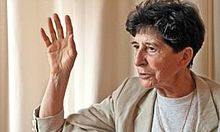Esther Ferrer
Esther Ferrer | |
|---|---|
 | |
| Born | 1937 (age 86–87) San Sebastián, Spain |
| Nationality | Spanish |
| Occupation | Artist |
| Spouse | Tom Johnson |
| Website | estherferrer |
Esther Ferrer (born 1937 in San Sebastián, Spain)[1] is a Spanish performance artist. Ferrer received Spain's National Award for Plastic Arts (1999),[2] the Marie-Claire Prize for Contemporary Art in France,[3] and the Velázquez Plastic Arts Prize.[4]
History and career
In 1966 she joined Walter Marchetti and Juan Hidalgo Codorniu in the Spanish performance art group Zaj,[5] famous for its radical and conceptual performances, whose controversial "concerts" were presented in Spanish concert halls despite the censorship of Franco's regime. Zaj also performed in many other countries for 30 years, until 1996, when the group broke up after a retrospective in the Reina Sofia Museum in Madrid.
As a performer she has participated in festivals in Canada, Korea, the United States and Japan, and throughout Europe (France, Italy, Holland Belgium, Bulgaria, Switzerland, England, the Czech Republic, Poland, Denmark, Norway, Slovakia, Germany and Hungary).[6] Her production also includes objects, photos, video pieces, visual systems based on prime numbers, and a large collection of self-portraits in many media.
Ferrer is the author of two radio productions made for Radio Nacional de España (Au rhythm du temps and Ta, te, ti, to, tu ou l'agriculture dans le Moyen Age) and has given seminars on the performance arts in Universities and in Schools of Fine Arts in Spain, France, Italy, Canada, Switzerland and Mexico.[7]
Ferrer represented Spain in the Venice Bienal in 1999,[8] and did large individual shows in subsequent years in the FRAC Bretagne (Rennes, France), MACVAL (Val de Marne, France), and with the Instituto Cervantes in several South American cities. In autumn 2022 opened a solo retrospective exhibit in Opelvillen Rüsselsheim, as part of Spain being guest of honour at Frankfurt book fair 2022. [9] In September 2022, Esther Ferrer was the recipient of the Prix international de Littérature Bernard Heidsieck Prix d'honneur awarded by Centre Pompidou and Archivio Conz.
She is married to minimalist composer Tom Johnson.[10]
References
- ^ "Esther Ferrer Biography – Esther Ferrer on artnet". www.artnet.com. Retrieved 2019-03-06.
- ^ "Esther Ferrer. Sculpture. Biography and works at Spain is culture". www.spainisculture.com. Retrieved 2019-03-06.
- ^ "Léa Barbazanges et Esther Ferrer lauréates du Prix Marie Claire de l'art contemporain pour une artiste femme". Marie Claire (in French). Retrieved 2019-03-06.
- ^ "Esther Ferrer, awarded with the Velázquez Plastic Arts Prize". www.etxepare.eus. Retrieved 2019-03-06.
- ^ "Esther Ferrer. Intertwined Spaces (Press release)" (PDF). Guggenheim Bilbao. February 2018. Retrieved 6 March 2019.
- ^ Utilisateur, Super. "initio". estherferrer.fr. Retrieved 2019-03-06.
- ^ Utilisateur, Super. "accueil (2)". estherferrer.fr (in French). Retrieved 2019-01-18.
- ^ "Biography". Bilbao Fine Arts Museum. Retrieved 6 March 2019.
- ^ "Opelvillen". www.opelvillen.de. Retrieved 2022-10-18.
- ^ "Tom Johnson - Concerts, Biography & News - BBC Music". BBC. Retrieved 2020-03-26.
External links
- Archivio Conz
- Esther Ferrer: Works and Process Archived 2011-10-08 at the Wayback Machine Two-part documentary series on Esther Ferrer
- FONS AUDIO #1: Esther Ferrer A podcast on the artist and the Zaj Group
- Official Esther Ferrer Website.
